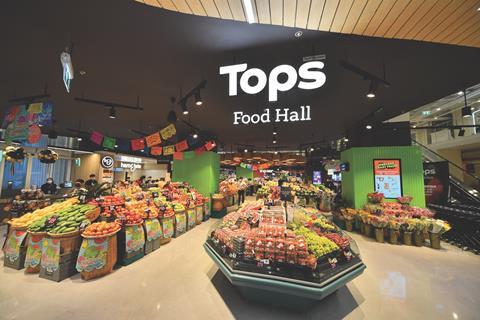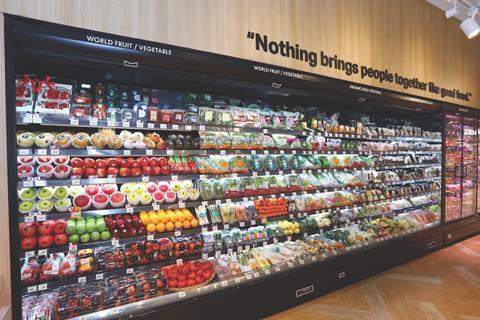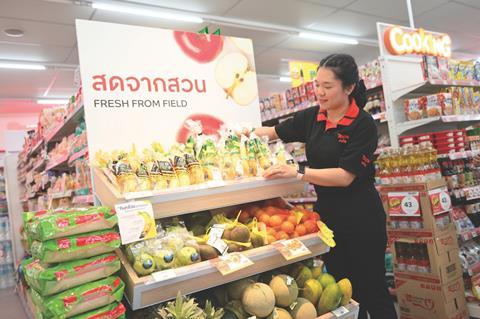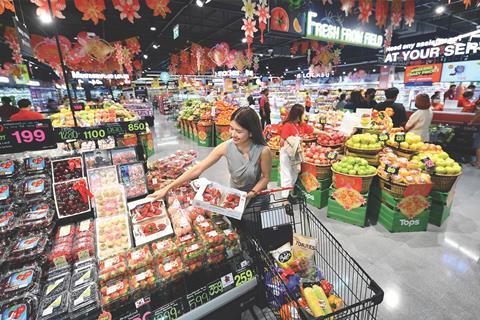Stephane Coum, chief executive of leading Thai supermarket retailer Central Food Group, talks exclusively to Asiafruit about the rebound in physical retail post-Covid and the shift to omnichannel

CEO of Central Food Group Stephane Coum has an impressive track record in the global retail industry spanning more than 30 years. The Frenchman’s journey in retail started out in his hometown in Brittany working in his local Leclerc hypermarket store at weekends.
After attending business school and working for a period in the automotive sector, Coum returned to retail to train as a store manager in 1996 at Stoc Supermarket, which was bought out by Carrefour in 2000. Having served in several store management positions for Carrefour in France, he began his international journey with a move to Turkey.
He was later promoted to regional manager in Shanghai for Carrefour, before stints in Malaysia and Singapore. His most recent role before joining Tops/Central Food was director of operations for Carrefour Italia.
Coum was appointed chief executive of Central Food Group in September 2019 with a particular focus on driving the group’s digital strategy. He wasted no time in implementing organisational changes. When he arrived, CFG was an aggregation of companies, but Coum sought to create a more open, unified structure. He also led a focus on building the retailer’s online channels.
Both moves helped the company to navigate the turmoil that ensued in 2020 with the onset of the Covid-19 pandemic. Looking back on what was a tumultuous time for physical retail in general, Coum is philosophical.
“When Covid hit, a lot of retail experts suggested offline was dead, that brick-and-mortar retail was finished, but our customers across Thailand want to socialise and they want to see products physically,” he said. “What we’ve seen since the pandemic is that omnichannel – the seamless shopping experience across all channels: in-store, online and mobile – is the most important.”
Thailand’s economy – and in turn its retail market – took a major hit during Covid, largely due to the serious impacts on its tourism trade. “Thailand has a 60m-plus population, plus 40m tourists, so during Covid, we immediately lost around 40 per cent of our potential customers,” Coum explains. “But our sales recovered in 2023 thanks to the tourists who came back to Thailand. Online has remained resilient after Covid, but the physical stores have continued to be very efficient.”

Four retail clusters
Brick-and-mortar stores are very much the backbone of the Central Food Retail business, which operates in four key ‘clusters’.
Tops Food Hall, its brand of high-end food halls spanning 2,000m2-4,000m2, numbers around 20 stores and contributes some 20 per cent of its total sales.
Tops Supermarket has around 160 stores in 46 provinces across Thailand. Coum says this makes the group the “clear leader” in Thailand’s supermarket sector with a 40 per cent market share. Its supermarket stores cater to the upper and premium mass market, targeting A, B and C+ customer profiles. Tops Premium features a larger premium and imported food assortment versus the standard Tops Supermarket. The other major format is its convenience stores, which were all converted to the Tops Daily brand in 2023 following Central Food’s buyout of FamilyMart. “I decided to create one brand to give us much more visibility to our customers,” Coum explains. Today, the company has some 511 Tops Daily convenience stores and minimarts across the country.
Omnichannel shift
But it is the growth of omnichannel – the rise of online platforms and the integration of these with its physical stores – that has defined Central Food’s direction of late, Coum notes.
Tops Online, Top’s own online business, has been growing over the past six years, particularly during the pandemic, he says. Omnichannel also includes so called ‘quick commerce’, where online delivery platform partners such as Grab and Foodpanda pick product from the shelves of its stores and deliver to customers. Another pillar of online is the third-party Marketplace, which includes Lazada, Shopee and TikTok among others. The fourth segment is Tops’ Personal Shopper.
“We have around 500 associates who assist our customers to do their shopping. They propose new products with instant communication,” he explains. “Customers can also make pre-orders of new in-season products and we deliver to their homes, or they come to pick up at our stores.”

Omnichannel now accounts for 10 per cent of Central Food’s total sales, according to Coum.
“Between Tops Online, quick commerce, Tops Marketplace and Personal Shopper, customers have the opportunity to switch from pure offline to omnichannel,” he says. “What I see with the experience of omnichannel is a strong bridge between offline and online. Customers who are shopping online are those who are very loyal with us offline too.”
Turning back to brick-and-mortar stores, Coum insists there is good potential for growth in Thailand.
“Our five-year plan is based on an expansion of around ten supermarkets per year, especially in the top six cities all over the country,” he says.
Smaller convenience formats are also a key focus. “We’ll accelerate the expansion of our Tops Daily. 2024 was a year of consolidation after converting all the FamilyMart stores in 2023, but we’re aiming to open between 30 and 35 stores per year from next year,” he says. “We’re increasing the number of SKUs on fresh produce in these outlets, especially on vegetables.”
Price-oriented consumer
While Tops/Central Food Group maintains its reputation as a premium supermarket retailer focused on higher end customer groups, Thailand’s sluggish economic recovery from Covid, and the cost-of-living crisis, has led the retailer to adapt.
“Have we seen some changes in consumption? Yes, people have become more price-oriented. This is why we launched a price-lock campaign a few months ago to freeze the prices of essential items in order to help the population live better,” he says. “We’re locking the prices for the next 12 months, which is quite difficult, especially in fresh where the prices move every day.”
In keeping with this trend, Coum says private label is becoming ever-more important. “Today, private label represents more than 11 per cent of our business, versus 7 per cent five years ago, and we continue to extend our range of products to help our customers find a quality product at a more affordable price,” he says. “That includes fresh produce offerings too, where we have the My Choice brand.”
Tops/Central Food is seeking to cater to the mass market more generally, he notes. “We’re upgrading our business model with more affordable and private label products to answer the expectations of customers with a B, C or D profile.”

Economic headwinds aside, Tops/Central Food’s fresh produce offering is still characterised by quality and assortment. The retailer continues to cultivate its reputation as a ‘destination’ for fruit and vegetable shoppers.
Some 50 per cent of its fresh fruit sales are imported, sourced from a diverse range of global origins, including Australia, New Zealand, the US, France, Italy, Chile, South Africa, India, Japan, Vietnam, Korea and China. Central Food is a leader in sales of high-value categories such as apples, berries, cherries and grapes – and it offers a huge variety of products for consumers.
“We’re the best retailer in terms of assortment of apples,” Coum points out. “We offer more than 70 different varieties all year round.”
So does ranging this many varieties result in higher rates of shrinkage? Coum insists not. Shrinkage is controlled via a combination of store replenishment and ensuring product meets quality specifications when it reaches the retailer’s DC, he says, with adequate shelf-life to last several days on the shelf. The small percentage of product that goes past its sales cycle is donated to foodbank associations, Coum adds.
In addition to minimising waste, Tops is moving to cut its use of plastic packaging. “Thailand is the sixth country worldwide in terms of plastic pollution, so it’s our duty to take a stand on this issue,” says Coum. “Our team in charge of sustainability is working to find solutions. Firstly, with packaging of our private label products; and secondly working with our suppliers to convert from conventional plastic packaging to biodegradable packaging. We’re moving faster on it, especially for all our cherries and vegetables.”
This interview is taken from the July/August 2024 edition of Asiafruit. Pick up your copy at Asia Fruit Logistica




